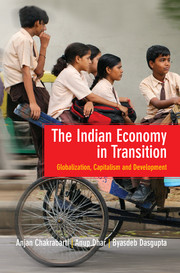Book contents
- Frontmatter
- Contents
- Preface
- Introduction
- Chapter I The Condition of the Working Class in Contemporary India
- Chapter II Capitalism: The ‘Delusive Appearance of Things’
- Chapter III Post-colonial Development and ‘The Thought of the Outside’
- Chapter IV The Word and the World of Neo-liberalism
- Chapter V The Scrypt of Transition: Between the Spectral and the Secret Thereof
- Chapter VI From Self-reliance to Neo-liberalism: The Political Economy of ‘Reform’ (1991–2014)
- Chapter VII Global Capitalism and World of the Third: The Emergent Cartography of the Indian Economy
- Chapter VIII Inclusive Development, State and Violence
- Chapter IX From Economic Crisis to Transition Crisis
- Conclusion
- Bibliography
- Author Index
- Subject Index
Preface
Published online by Cambridge University Press: 18 December 2015
- Frontmatter
- Contents
- Preface
- Introduction
- Chapter I The Condition of the Working Class in Contemporary India
- Chapter II Capitalism: The ‘Delusive Appearance of Things’
- Chapter III Post-colonial Development and ‘The Thought of the Outside’
- Chapter IV The Word and the World of Neo-liberalism
- Chapter V The Scrypt of Transition: Between the Spectral and the Secret Thereof
- Chapter VI From Self-reliance to Neo-liberalism: The Political Economy of ‘Reform’ (1991–2014)
- Chapter VII Global Capitalism and World of the Third: The Emergent Cartography of the Indian Economy
- Chapter VIII Inclusive Development, State and Violence
- Chapter IX From Economic Crisis to Transition Crisis
- Conclusion
- Bibliography
- Author Index
- Subject Index
Summary
If judged by everyday experience, it is a paradox that it is the earth which revolves round the sun. It is also a paradox that water is composed of two highly inflammable gases. Scientific truth, perhaps, is always paradox, if judged by everyday experience, which catches the delusive appearance of things. Is India's economic transition, touted as India's emergence as a global superpower – ‘shining India’ – such a bitter paradox? What then is the truth of transition? What is it that the transition narrative is hiding? What are its secrets? What is buried behind the success story of transition? What is behind the everyday experience of transition? How does one work through the delusive appearance of things? It has taken the three of us years to think through these questions; think through in dialogue, debate and reflective deliberation. Mentors and friends have over the years left their indelible imprint on our work, on our journey through the thorny walkway of concepts, categories, texts and experiences. They have stood by our liking, surprise, anger and despair at how India's economic transition was being represented by academics and popular media. They have also offered hope and alternatives. We begin by thanking Arup Kumar Mallick, Ashis Nandy, Stephen Cullenberg, Richard Wolff, Ian Parker, Erica Burman, S Charusheela, Sarmila Banerjee, Sunanda Sen and Anirban Chattopadhyay. They have interacted with us over the years, and also commented upon and criticized many aspects of our thinking. We have learnt a lot from them. It is a pity, late Stephen Resnick, late Kalyan Sanyal and late Julie Graham shall not read this preface; we lost them as we worked through the maze: India's economic transition. We must also thank Joel Wainwright, China Mills, Mwangi Githinji, Ranabir Samaddar, Ranjita Biswas, Asha Achuthan, Olga Nieuwenhuys, David Ruccio, Rajesh Bhattacharyaa, Kausik Lahiri, R S Deshpande, Sankar Bhowmik, Yahya Madra, Ceren Özselçuk, Shatakshee Dhongde, Wrick Mitra, Deepti Sachdev, Shyamolima Ghosh Chowdhury, Rajesh K P, Gurpreet Kaur, Imran Amin, Sabah Siddiqui, Rakhi Ghoshal, Maidul Islam, Anindya Purakayastha, Shraddha Chatterjee, Swagato Sarkar, Nandan Nawn, Rukmini Sen, Shubhra Nagalia, Bhavya Chitranshi, Anshumita Pandey and Satyaki Roy for having followed our work closely, for having made critical comments on our position and for suggesting improvements.
- Type
- Chapter
- Information
- The Indian Economy in TransitionGlobalization, Capitalism and Development, pp. vii - viiiPublisher: Cambridge University PressPrint publication year: 2015

